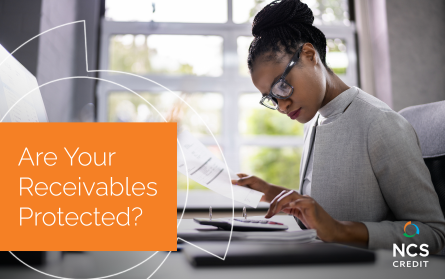
The Bankruptcy Wave Isn’t Coming… It’s Already Here.
According to Epiq AACER and the American Bankruptcy Institute, commercial Chapter 11 filings in March 2025 jumped 20% over the previous year. The trend has continued into 2025, with key sectors like retail, construction, and healthcare feeling the pressure.
Why the increase? Inflation. Interest rates. Unstable supply chains. And yes, tariffs. Financial pressure is mounting, and when a business collapses, creditors often end up with nothing but unpaid invoices.
If you’re a supplier, lender, contractor, subcontractor, or equipment lessor, it’s time to take control. Let’s review what’s happening, what it means, and how tools like UCC filings and mechanic’s liens offered by NCS Credit, can help you get paid in the event your customer defaults on payment terms or files for bankruptcy protection.
Understand How Chapters 7 & 11 Bankruptcy Work
If your customer files for bankruptcy protection, here’s what you need to know:
Chapter 7: Liquidation
- The company shuts down, and a court-appointed trustee sells off its assets.
- Creditors with secured claims (like those with a properly filed UCC or lien) are paid first.
- Unsecured creditors? Often left with nothing.
If you’re not secured, Chapter 7 can leave you out in the cold.
Chapter 11: Reorganization
- The business continues operating while restructuring its debts.
- Debtor proposes a plan to restructure and repay creditors over time.
- Secured creditors have a much stronger position at the table.
Bottom line, whether it’s Chapter 7 or 11, secured creditors are in a better spot to get paid, and you become a secured creditor by filing UCCs and mechanic’s liens.
Did You Know: Receiving $0.98 on the dollar, secured creditors recovered 77% more than unsecured creditors in 2024 Chapter 11 bankruptcies.
Payout Priority in Bankruptcy Cases
The bankruptcy code is specific, detailed and, well…it’s long – but here is the basic payout priority:
Payout Priority in Chapter 11 Bankruptcy
- Secured Creditors (i.e. creditors who have a perfected security interest)
- Administrative Expenses (i.e. costs associated with filing & processing the bankruptcy)
- Unsecured Creditors (i.e. creditors without a security interest)
Why Business Bankruptcies Are Increasing
From late 2023 through 2025, business insolvencies have steadily increased. Here’s what’s driving it:
- Inflation continues to shrink already-tight margins.
- Interest rate hikes are making it more expensive to borrow and refinance.
- Shifting consumer behavior is hammering retailers and service providers.
- Slow payments in construction and manufacturing are causing ripple effects throughout the supply chain.
- New tariffs on imported goods are increasing costs across multiple industries.
When one business can’t pay, others downstream feel the impact. If you’re extending credit, you’re carrying the risk.
Industries Under Pressure
Here’s where we’re seeing some of the fallout:
- Healthcare: Hospitals and medical suppliers are struggling with reimbursement cuts and labor shortages.
- Automotive: Parts suppliers are facing reduced EV demand, tariff pressures, and rising material costs.
- Casual Dining: Rising labor and food costs are squeezing margins as customer traffic drops.
- Retail: Several national chains have filed for bankruptcy amid online competition and falling in-store sales.

How Tools Like UCC Filings and Mechanic’s Liens Can Protect Your Payment Rights
Here’s the good news: you have legal tools to protect your payment rights.
File a UCC-1 Financing Statement
If you’re financing equipment, inventory, or receivables – or even just extending credit – file a UCC.
Why it matters:
- Puts the world on notice you have a security interest.
- Establishes your priority if your customer files for bankruptcy.
- Helps you recover your collateral or proceeds from its sale.
Pro Tip: First to file = first in line. Don’t wait.
Secure Your Mechanic’s Lien Rights
If you provide labor, materials, or equipment to a construction project, mechanic’s liens are your best friend.
Why use them:
- Gives you a legal claim against the improved property.
- Puts pressure on owners and GCs to resolve payment issues.
- Protects your position in and outside of bankruptcy.
Pro Tip: Lien rights are time-sensitive and vary by state. Know your deadlines and send preliminary notices when required.
Do Secured Creditors Really Get Paid?
Yes, secured creditors really do get paid. Although every bankruptcy plan is different, here’s a chart of recent bankruptcy exits, and the amount recovered by secured creditors versus the unsecured creditors.
In review of commercial bankruptcies with plans effective 01/01/2023 – 10/01/2024. On average, secured creditors recovered 96% of allowed claims and unsecured creditors recovered 5.4% of allowed claims.

A Little Paperwork Now Beats a Big Loss Later
Bankruptcy doesn’t just affect the debtor; it sends financial shockwaves through the entire supply chain. A little paperwork up front, like filing a UCC or securing mechanic’s lien rights, can be the difference between getting paid and writing off a loss.
By understanding and using tools like UCC filings and mechanic’s liens, you can better navigate the complexities of the current economic landscape.
We Are Your Credit Ally
Whether you’re filing UCCs or mechanic’s liens, from a single request to a robust full-service program, we are your Credit Ally. With unparalleled industry expertise, we understand the complexities of commercial credit. Let us manage your secured transactions and save you time and money. Contact us today to learn more!
Be proactive. Be secured. And most importantly: get paid for the work you do.

Provincial Construction Payment Rights in Canada
Discover your payment rights on provincial construction projects in Canada, including how to secure bond claim rights and navigate Public Works Act claims.

A Quick Guide to Mechanic's Lien Rights in Canada
Explore the essentials of securing mechanic's lien rights in Canada, including deadlines, notice requirements, and key provincial variations.

Know Your Customer. Protect Your Cash Flow in Any Economy.
Strengthen credit relationships by knowing your customer and using UCC filings & mechanic's liens. Learn how to protect your business in any economy.